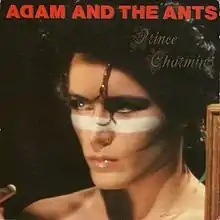Prince Charming (Adam and the Ants song)
"Prince Charming" was a number-one single in the UK Singles Chart for four weeks in September 1981 for Adam and the Ants.[2] Written by Adam Ant and Marco Pirroni, and featuring on the album of the same name, it was Adam and the Ants' second number-one single in a row[3] and was the fifth biggest hit of the year 1981.[4]
| "Prince Charming" | ||||
|---|---|---|---|---|
 | ||||
| Single by Adam and the Ants | ||||
| from the album Prince Charming | ||||
| B-side | "Christian D'or" | |||
| Released | 4 September 1981 | |||
| Genre | New wave | |||
| Length | 3:17 | |||
| Label | CBS | |||
| Songwriter(s) | Adam Ant and Marco Pirroni | |||
| Producer(s) | Chris Hughes[1] | |||
| Adam and the Ants singles chronology | ||||
| ||||
Music video
Band member and producer Merrick (Chris Hughes), normally on drums, played a stirring riff on an open-tuned acoustic guitar throughout the song. Lead guitarist Pirroni mimed to this part on both an orchestral harp and a miniature harp in the promotional video. The music video was notable for its extravagant production compared to the videos being produced at the time.
It featured Adam Ant in a male Cinderella role, complete with moustached drag queen evil step-sisters. The sisters accept an invitation to "Come to the ball, and dance the Prince Charming", leaving Adam home doing the chores.
Sitting at a table in an old-style kitchen, Adam is surrounded by his band members, who are encouraging him: "Don't you ever/Don't you ever/Stop being dandy, showing me you're handsome." His Fairy Godmother, portrayed by Diana Dors,[5] suddenly appears with five shirtless men dancing the "Prince Charming". With a wave of her magic wand, she transforms Adam's attire into flamboyant Regency clothes.
Adam makes a grand entrance onto the balcony at the ball, and swings down on a chandelier. He, the Ants, his Fairy Godmother, her male attendant and the invited guests of the ball dance the "Prince Charming", which became a much imitated arm-crossing dance as the song rose up the charts. Choreographer Stephanie Coleman explained that each hand movement in the Prince Charming dance had a meaning (in order: Pride, Courage, Humour, Flair) each representing an element of Adam Ant's personality. The video ends with Adam smashing a mirror, then singing the "Prince Charming, Prince Charming/Ridicule is nothing to be scared of" refrain as different characters: the Man with No Name (Clint Eastwood from the Dollars Trilogy), Alice Cooper, Sheik Ahmed Ben Hassan (Rudolph Valentino from the silent film The Sheik),[6] and Marlon Brando as Vito Corleone from The Godfather (replaced in an alternative edit of the video by Ant's own "Dandy highwayman" from the "Stand and Deliver" video.) The music video was one of Diana Dors' last on-screen performances.
Lyrics
According to Adam, Prince Charming is based on Beau Brummell. Pirroni described the song as "A cleverer song than any of you realise." He also said that the dance routine was initially developed when he realised that the beat of the song made it difficult to dance to in a conventional way, meaning it was unlikely to be played in discos and clubs.
"War Canoe"
On 27 March 2010, Rolf Harris claimed on BBC Radio 5 Live's Danny Baker Show that an out-of-court settlement had been reached, with a large sum of royalties received, after a musicologist found "Prince Charming" to be musically identical to Harris's 1965 song "War Canoe".[7]
References
- Buskin, Richard (January 2013). "Adam & The Ants 'Stand & Deliver'". Sound on Sound.
- Roberts, David (2006). British Hit Singles & Albums (19th ed.). London: Guinness World Records Limited. pp. 398–9. ISBN 1-904994-10-5.
- Rice, Jo (1982). The Guinness Book of 500 Number One Hits (1st ed.). Enfield, Middlesex: Guinness Superlatives Ltd. pp. 216–217. ISBN 0-85112-250-7.
- "Top 100 1981". UK-charts.top-source.info. 1981.
- Kutner, Jon (26 May 2010). 1000 UK Number One Hits. Omnibus Press. ISBN 9780857123602.
- "Stand and Deliver! - Unofficial Adam Ant Site". Oocities.org. 21 December 1989. Retrieved 23 October 2016.
- "Prince Charming". Songfacts.